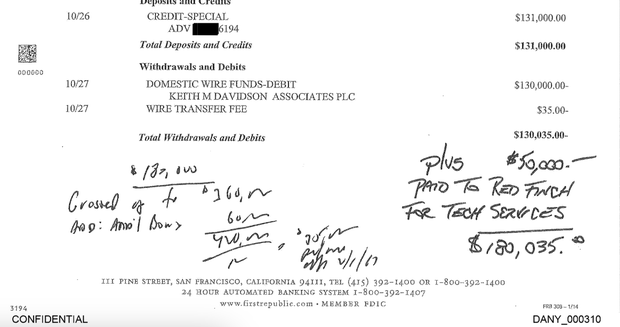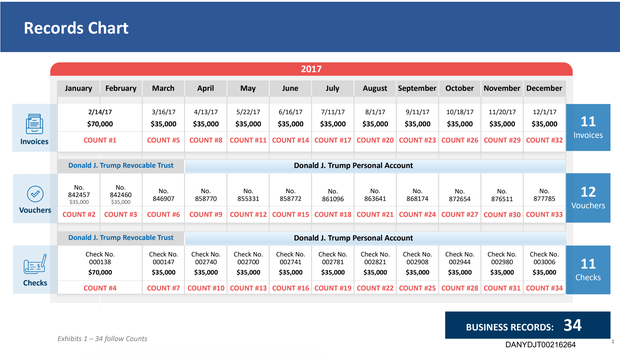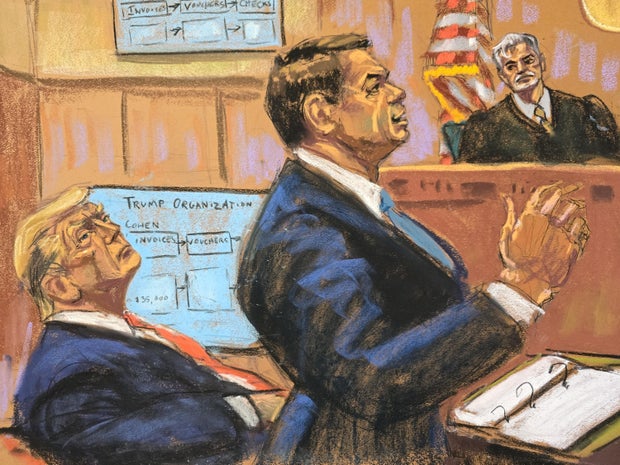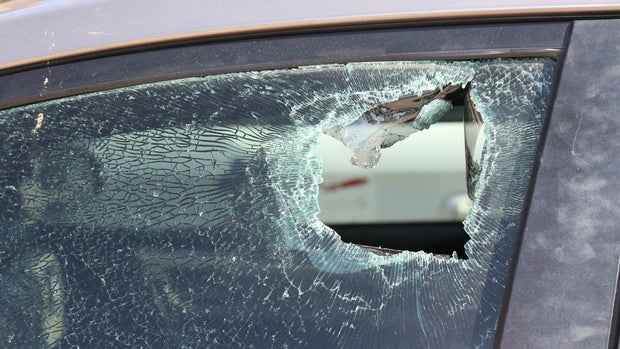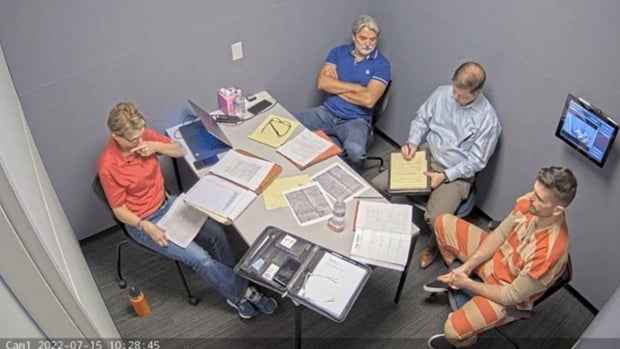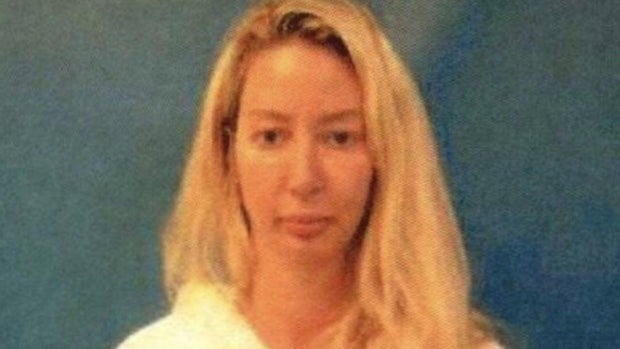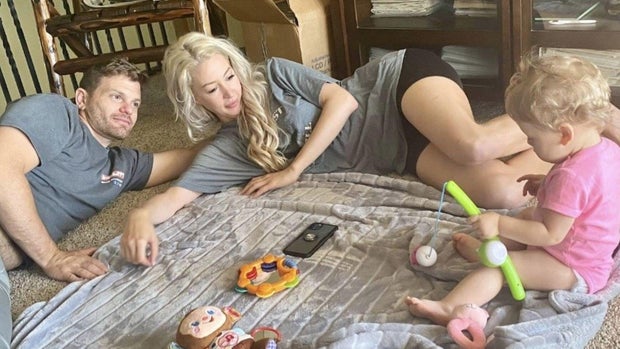CBS News
What was Trump convicted of? Details on the 34 counts and his guilty verdict

Former President Donald Trump’s conviction in New York stemmed from a $130,000 “hush money” payment his attorney Michael Cohen made to adult film star Stormy Daniels in the days before the 2016 election.
Prosecutors said the deal was meant to keep voters in the dark about Daniels’ allegation that she had sex with Trump years earlier, which he denies. But the actual charges that Trump faced were much less salacious, and dealt with the comparatively mundane paperwork that was generated when he reimbursed Cohen for the payment.
Here’s what to know about the charges Trump faced:
What was Trump convicted of?
Trump was charged with 34 counts of falsification of business records in the first degree, which is a felony in New York. He pleaded not guilty when he was arraigned last year.
In 2017, Cohen and Allen Weisselberg, an executive at the Trump Organization, reached an agreement about how Cohen would be repaid for the $130,000 that he sent to Daniels in exchange for her silence. Weisselberg detailed the calculations in handwritten notes that were shown to the jury at trial.
Cohen would receive $130,000 for the Daniels payment, plus $50,000 intended for a technology company that did unrelated work for Trump. That amount was doubled to account for taxes that Cohen would have to pay on the income. Weisselberg then tacked on an extra $60,000 as a bonus for Cohen, who was upset that his regular year-end award had been cut. The total worked out to $420,000.
Manhattan District Attorney’s Office
Cohen would be paid in a series of monthly payments of $35,000 over the course of 2017. The first check was for $70,000, covering two months. Cohen sent an invoice to the Trump Organization for each check, portraying the payment as his “retainer.” Bookkeepers then generated a record for the company’s books, known as a voucher, every time he was paid, with the description “legal expense.” The first three payments were made from Trump’s trust, while the remaining nine came from his personal account.
Each of the 34 charges against Trump corresponded to a check, invoice and voucher generated to reimburse Cohen. The prosecution laid out the charges in a chart that jurors saw several times during the trial:
Manhattan District Attorney’s Office
Prosecutors said Trump knew the payments were to reimburse Cohen for the Daniels payment, not for his legal expenses.
The jury voted to convict him on all 34 counts. As Trump looked on in court on Thursday afternoon, the clerk asked the foreperson of the jury for the verdict on each count.
“How say you to the first count of the indictment, charging Donald J. Trump with the crime of falsifying business records in the first degree, guilty or not guilty?” the clerk asked.
“Guilty,” the foreperson responded, repeating the answer 33 more times.
Why were the charges a felony?
Under New York law, falsification of business records is a crime when the records are altered with an intent to defraud. To be charged as a felony, prosecutors must also show that the offender intended to “commit another crime” or “aid or conceal” another crime when falsifying records.
In Trump’s case, prosecutors said that other crime was a violation of a New York election law that makes it illegal for “any two or more persons” to “conspire to promote or prevent the election of any person to a public office by unlawful means,” as Justice Juan Merchan explained in his instructions to the jury.
What exactly those “unlawful means” were in this case was up to the jury to decide. Prosecutors put forth three areas that they could consider: a violation of federal campaign finance laws, falsification of other business records or a violation of tax laws.
Jurors did not need to agree on what the underlying “unlawful means” were. But they did have to unanimously conclude that Trump caused the business records to be falsified, and that he “did so with intent to defraud that included an intent to commit another crime or to aid or conceal the commission thereof.”
What was Trump’s defense?
Jane Rosenberg
Trump’s lawyers argued that the payments to Cohen were for his work as Trump’s attorney, not reimbursements for the Daniels payment.
The defense argued that the descriptions on the invoices and records were accurate — Cohen held the title “personal attorney to the president” once Trump took office, and was being paid for his legal services under an unwritten retainer agreement. Therefore, their argument went, no business records were falsified.
They also focused much of their firepower on portraying Cohen as a liar, with the goal of discrediting his testimony. Cohen was the only witness who testified that Trump knew about the true purpose of the reimbursements, a crucial pillar of prosecutors’ effort to show Trump’s intent.
Ultimately, the jurors rejected the defense’s arguments and sided with prosecutors in finding Trump guilty.
When will Trump be sentenced?
Shortly after the verdict was handed down, Merchan, the judge, set Trump’s sentencing date for July 11, just days before the start of the Republican National Convention.
Under New York law, each count of falsifying business records in the first degree carries a maximum sentence of four years in prison and a $5,000 fine. But Merchan has broad discretion when it comes to imposing a sentence. Most legal observers expect him to punish Trump with little or no time behind bars, based on factors like Trump’s status as a first-time offender and his age. Merchan could instead rely on options like probation, home confinement or solely a fine.
Trump has vowed to appeal the verdict, and any sentence could be delayed until that process plays out.
CBS News
A week before Texas mom Alyssa Burkett’s murder, the killer received a text: “I hope you handle it”

After Alyssa Burkett was murdered, detectives quickly learned that the prime suspect was the father of her child, Andrew Beard. But as the investigation unfolded, they would find out that Beard wasn’t the only one involved in the murder plot.
Take a look inside the investigation.
Oct. 2, 2020 | 9 a.m.
Carrollton Police Department
Shortly after 24-year-old Alyssa Burkett pulled into her parking space at work in Carrollton, Texas, a man with a gun shot her in the head through her car window and fled.
Carrollton Police Department
Burkett survived the gun blast, got out of her car and tried to get help. Her bloody hand left a print on the office window.
The assailant saw Burkett running and chased after her. He stabbed and slashed Alyssa 44 times and left the scene in his black SUV.
Lizatte Bowers/Alyssa Burkett, Facebook
When Burkett’s mother, Teresa Collard, arrived at the scene, she immediately gave detectives a name: Andrew Beard. Beard was the father of Burkett’s 1-year-old child, Willow.
Oct. 2, 2020 | 12 p.m.
Carrollton Police Department
Hours after the murder, police officers stopped Beard in his white Ford F-150 pickup truck. His fiancée, Holly Elkins, and baby Willow were with him. Beard was told he could leave the scene, but he couldn’t return home. Officers also seized his pickup truck.
Oct. 2, 2020 | 9 p.m.
Carrollton Police Department
Later that night, police searched Beard’s home and found a GPS tracker battery and charging stations that matched a tracking device detectives discovered under Burkett’s car earlier that day.
Carrollton Police Department
Investigators also uncovered what they believed to be an unregistered gun silencer.
Oct. 3, 2020 | 12 p.m.
Carrollton Police Department
The next day, detectives searched Beard’s white F-150 pickup truck and found a backpack. Inside, they uncovered two bottles of dark brown makeup, and a pair of men’s hiking boots that had been cut into pieces and were soaking in bleach.
Oct. 3, 2020
Carrollton Police Department
Later that night, police located that black Ford SUV the assailant drove to the scene. It was found abandoned less than a mile from Beard’s house.
Carrolton Police Department
When detectives searched the SUV, they found a fake beard smeared with dark brown makeup.
Oct. 5, 2020
Carrolton Police Department
When Beard learned there was a warrant for his arrest, he turned himself in to the Carrollton Police Department. He was charged with murder.
Oct. 6, 2020
Beard’s fiancée, Holly Elkins, voluntarily went to speak with detectives at the Carrollton Police Department.
Carrolton Police Department
During the interview, Elkins told investigators that Beard was at home with her on the morning of the murder. She also described herself as a “stage 5 clinger girlfriend,” and said she would have known if Beard left the house that morning.
Oct. 6, 2020 | 1:30 p.m.
Carrollton Police Department
After her interview, investigators said Elkins made the following internet searches:
“Can I not be brought to court if I have a psychiatrist note?”
“vulnerable patients going to court”
“contact psychiatrist in Dallas”
“Can I not be subpoenaed to jail if I have a mental issue?”
Oct. 29, 2020
Beard spent two weeks behind bars before he was released on bond. Carrollton Police Det. Jeremy Chevallier said he was worried about baby Willow’s safety, so he reached out to the federal government to take the case under federal firearm laws.
Because detectives found an unregistered silencer during the search of Beard’s home, the federal government agreed to take the case.
Carrollton Police Department
Eight days after he bonded out, Beard was rearrested and ultimately charged with cyberstalking using a dangerous weapon resulting in death.
July 15, 2022
In June 2022, Beard pleaded guilty to cyberstalking and using a dangerous weapon resulting in death.
FBI
One month later, he spoke to the FBI as part of a plea deal. And he had a lot to say about Elkins’ involvement in Burkett’s murder.
“…It was…’this is how you’re gonna do this,’ it was, ‘… you’re gonna wear this dark makeup …’ That was her plan…that’s how it’s gonna be done,” Beard told the FBI.
May 24, 2023
Beard was sentenced to 43 years in federal prison.
June 21, 2023
After speaking with Beard, the FBI spent about a year building a case against Elkins.
Investigators found internet searches and a Walgreens receipt that connected her to the crime.
Carrollton Police Department
They also dug into text messages between Elkins and Beard. In a text sent to Beard one week before Burkett’s murder, Elkins wrote, “I hope you handle it I’m not coming home to b**s***”
Elkins was indicted on three charges: conspiracy to stalk, stalking using a dangerous weapon resulting in serious bodily injury and death and brandishing a firearm in relation to a crime of violence.
July 6, 2023
Johnson County Sheriff’s Office
Elkins was arrested at the Miami airport by federal agents after returning from a trip to the Dominican Republic.
April 9 – 16, 2024
Lizette Bowers
Elkins’ trial began at the federal courthouse in downtown Dallas. After six days, the case went to the jury.
April 17, 2024
Stephen Green
The jury deliberated for about an hour-and-a-half before they found Elkins guilty on all counts. On Aug. 15, 2024, Elkins was sentenced to two life terms.
CBS News
A week before Texas mom Alyssa Burkett’s murder, the killer received a text: “I hope you handle it”

After Alyssa Burkett was murdered, detectives quickly learned that the prime suspect was the father of her child, Andrew Beard. But as the investigation unfolded, they would find out that Beard wasn’t the only one involved in the murder plot.
Take a look inside the investigation.
Oct. 2, 2020 | 9 a.m.
Carrollton Police Department
Shortly after 24-year-old Alyssa Burkett pulled into her parking space at work in Carrollton, Texas, a man with a gun shot her in the head through her car window and fled.
Carrollton Police Department
Burkett survived the gun blast, got out of her car and tried to get help. Her bloody hand left a print on the office window.
The assailant saw Burkett running and chased after her. He stabbed and slashed Alyssa 44 times and left the scene in his black SUV.
Lizatte Bowers/Alyssa Burkett, Facebook
When Burkett’s mother, Teresa Collard, arrived at the scene, she immediately gave detectives a name: Andrew Beard. Beard was the father of Burkett’s 1-year-old child, Willow.
Oct. 2, 2020 | 12 p.m.
Carrollton Police Department
Hours after the murder, police officers stopped Beard in his white Ford F-150 pickup truck. His fiancée, Holly Elkins, and baby Willow were with him. Beard was told he could leave the scene, but he couldn’t return home. Officers also seized his pickup truck.
Oct. 2, 2020 | 9 p.m.
Carrollton Police Department
Later that night, police searched Beard’s home and found a GPS tracker battery and charging stations that matched a tracking device detectives discovered under Burkett’s car earlier that day.
Carrollton Police Department
Investigators also uncovered what they believed to be an unregistered gun silencer.
Oct. 3, 2020 | 12 p.m.
Carrollton Police Department
The next day, detectives searched Beard’s white F-150 pickup truck and found a backpack. Inside, they uncovered two bottles of dark brown makeup, and a pair of men’s hiking boots that had been cut into pieces and were soaking in bleach.
Oct. 3, 2020
Carrollton Police Department
Later that night, police located that black Ford SUV the assailant drove to the scene. It was found abandoned less than a mile from Beard’s house.
Carrolton Police Department
When detectives searched the SUV, they found a fake beard smeared with dark brown makeup.
Oct. 5, 2020
Carrolton Police Department
When Beard learned there was a warrant for his arrest, he turned himself in to the Carrollton Police Department. He was charged with murder.
Oct. 6, 2020
Beard’s fiancée, Holly Elkins, voluntarily went to speak with detectives at the Carrollton Police Department.
Carrolton Police Department
During the interview, Elkins told investigators that Beard was at home with her on the morning of the murder. She also described herself as a “stage 5 clinger girlfriend,” and said she would have known if Beard left the house that morning.
Oct. 6, 2020 | 1:30 p.m.
Carrollton Police Department
After her interview, investigators said Elkins made the following internet searches:
“Can I not be brought to court if I have a psychiatrist note?”
“vulnerable patients going to court”
“contact psychiatrist in Dallas”
“Can I not be subpoenaed to jail if I have a mental issue?”
Oct. 29, 2020
Beard spent two weeks behind bars before he was released on bond. Carrollton Police Det. Jeremy Chevallier said he was worried about baby Willow’s safety, so he reached out to the federal government to take the case under federal firearm laws.
Because detectives found an unregistered silencer during the search of Beard’s home, the federal government agreed to take the case.
Carrollton Police Department
Eight days after he bonded out, Beard was rearrested and ultimately charged with cyberstalking using a dangerous weapon resulting in death.
July 15, 2022
In June 2022, Beard pleaded guilty to cyberstalking and using a dangerous weapon resulting in death.
FBI
One month later, he spoke to the FBI as part of a plea deal. And he had a lot to say about Elkins’ involvement in Burkett’s murder.
“…It was…’this is how you’re gonna do this,’ it was, ‘… you’re gonna wear this dark makeup …’ That was her plan…that’s how it’s gonna be done,” Beard told the FBI.
May 24, 2023
Beard was sentenced to 43 years in federal prison.
June 21, 2023
After speaking with Beard, the FBI spent about a year building a case against Elkins.
Investigators found internet searches and a Walgreens receipt that connected her to the crime.
Carrollton Police Department
They also dug into text messages between Elkins and Beard. In a text sent to Beard one week before Burkett’s murder, Elkins wrote, “I hope you handle it I’m not coming home to b**s***”
Elkins was indicted on three charges: conspiracy to stalk, stalking using a dangerous weapon resulting in serious bodily injury and death and brandishing a firearm in relation to a crime of violence.
July 6, 2023
Johnson County Sheriff’s Office
Elkins was arrested at the Miami airport by federal agents after returning from a trip to the Dominican Republic.
April 9 – 16, 2024
Lizette Bowers
Elkins’ trial began at the federal courthouse in downtown Dallas. After six days, the case went to the jury.
April 17, 2024
Stephen Green
The jury deliberated for about an hour-and-a-half before they found Elkins guilty on all counts. On Aug. 15, 2024, Elkins was sentenced to two life terms.
CBS News
Trump picks Karoline Leavitt to be youngest ever White House press secretary

President-elect Trump on Friday named Karoline Leavitt, his campaign press secretary, to serve as his White House press secretary.
Leavitt, 27, currently a spokesperson for Trump’s transition, would be the youngest White House press secretary in history. Previously that distinction went to Ronald Ziegler, who was 29 when he took the position in 1969 in Richard Nixon’s administration.
“Karoline Leavitt did a phenomenal job as the National Press Secretary on my Historic Campaign, and I am pleased to announce she will serve as White House Press Secretary,” Trump said in a statement. “Karoline is smart, tough, and has proven to be a highly effective communicator. I have the utmost confidence she will excel at the podium, and help deliver our message to the American People as we Make America Great Again.”
Leavitt replied in a post on X, formerly Twitter: “Thank you, President Trump, for believing in me. I am humbled and honored. Let’s MAGA,” the acronym for “Make America Great Again.”
The White House press secretary typically serves as the public face of the administration and historically has held daily briefings for the press corps.
MEGA
Trump disrupted those norms in his first term, preferring to serve as his own chief spokesperson. While he was president from 2017 to 2021, Trump had four press secretaries but frequently preferred to engage directly with the public, from his rallies, social media posts and his own briefings.
At a news conference this past August, Trump was asked if he’d have regular press briefings in his new administration. He told reporters, “I will give you total access and you’ll have a lot of press briefings and you’ll have, uh, from me.”
When it came to a press secretary, he said: “Probably they’ll do something. If it’s not daily, it’s going to be a lot. You’ll have more than you want.”
Leavitt, a New Hampshire native, is seen as a staunch and camera-ready advocate for Trump who is quick on her feet and delivers aggressive defenses of the Republican in television interviews.
She worked as a spokesperson for MAGA Inc., a super PAC supporting Trump, before joining his 2024 campaign. In 2022, she ran for Congress in New Hampshire, winning a 10-way Republican primary before losing to incumbent Democratic Rep. Chris Pappas.
During Trump’s first term in office, Leavitt worked in the White House press office. She then became communications director for New York Republican Rep. Elise Stefanik, whom Trump has tapped to serve as his U.S. ambassador to the United Nations.
Trump’s first press secretaries, Sean Spicer and Sarah Huckabee Sanders, were known for quarreling with reporters. Another, Stephanie Grisham, never held a briefing. Her successor, Kayleigh McEnany, often lectured the news media during her appearances in the White House press briefing room.


